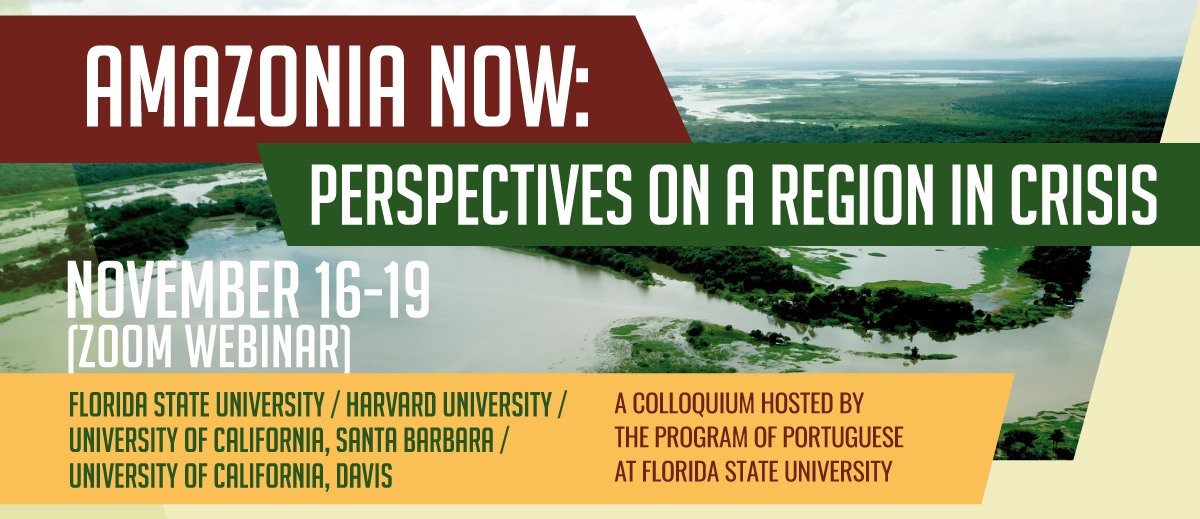
[logoshowcase order=”DESC”]
Schedule | Speakers | Registration | Contact
The Amazon region is increasingly under threat due to climate change, socio-environmental conflict, and unhindered development. In “Amazonia Now: Perspectives on a Region in Crisis,” academics and researchers of Amazonia, Amazonian indigenous and social movement leaders, and other experts on the region will address these and other ongoing issues and threats to the region. Join us November 16–19, 2020 via zoom for these important discussions.
“Amazonia Now: Perspectives on a Region in Crisis” aims to offer a space to reflect on challenges in the region including unhindered development, land conflict and violence, environmental catastrophe, deforestation, mining, fires, and the hostile government of Brazil’s Jair Bolsonaro. Throughout the event, participants will be invited to exchange experiences that look towards alternatives to conventional development. It will also be a chance to think about the future of the Amazon region and the potential impacts after the results of The United States election.
The discussions will be held in a collaborative, open, and friendly atmosphere and will provide a rich opportunity for Indigenous leaders, environmentalists, politicians, artists, and academics to make connections and rethink the legacies, demands, and prospects for the diverse groups and sectors that shape the Amazon. The event is free and open to the public (registration is needed in order to attend the screening and/or talks) with conversations being held in English, Spanish and Portuguese.
“Amazonia Now” is organized under the auspices of the Portuguese Program in the Department of Modern Languages and Linguistics at Florida State University, with support from Harvard University, University of California-Davis, and University of California-Santa Barbara. We will continue discussions initiated by the David Rockefeller Center for Latin American Studies at Harvard University during their Worldwide Week in October 2020 (The Future of the Amazon, Lessons from the Past Oct. 5–9).
 Download Poster-English
Download Poster-English
Download Poster-Português
Schedule
November 15, 2020
4:00PM (ET) 6:00PM (BSB)
The Pink Indian Against the Invisible Beast – Noel Nutels
(O Índio Cor de Rosa Contra a Fera Invisível – Noel Nutels)
Directed by Tiago Carvalho
Introduced by Alice Lopes, Florida State University, followed by a Q&A with the diretor.
November 16, 2020
Welcome by Reinier Leushuis, the Chair of the Department of Modern Languages and Linguistics – Florida State University
Reading of “Curupira” by Juan Carlos Galeano, a homage to the people and land of the Amazon – Florida State University
Violence and Cultures of Resistance
3:00PM (ET) 5:00PM (BSB)
Violence and the Discourse of the State on Indigenous Populations
Moderator: Oscar de la Torre – University of North Caroline, Charlotte
Idelber Avelar – Tulane University
Beatriz Azevedo – UNICAMP State University of Campinas / FAPESP Research Foundation
5:00PM (ET) 7:00PM (BSB)
(…) And the Verb Became Amazonia: Linguistic Diversity and Necropolitics
Moderator: Joaquim Barbosa – Federal University of the Amazonas (UFAM)
José Ribamar Bessa Freire – Rio de Janeiro State University (UERJ)
Ivânia Neves – Federal University of Pará (UFPA)
November 17, 2020
The Complex Fabric of Amazonia
12:00PM (ET) 2:00PM (BSB)
Socio-Environmental Conflicts in the Amazon
Moderator: Jessica Carey-Webb – Natural Resources Defense Council
Susanna Hecht – University of California, Los Angeles
Edna Castro – Federal University of Pará (UFPA)
Jeffrey Hoelle – University of California, Santa Barbara
3:00PM (ET) 5:00PM (BSB)
People of the Forest Beyond the State
Moderator: Amanda M. Smith – University of California, Santa Cruz
Stefano Varese – University of California, Davis
Aparecida Vilaça – Federal University of Rio de Janeiro (UFRJ)
Carolina Comandulli – University College London
November 18, 2020
Past and Contemporary Narratives
12:00PM (ET) 2:00PM (BSB)
People of the Rainforest
Moderator: Alexandre Cardoso – Federal University of Maranhão (UFMA)
John Hemming – Author of Red Gold: The Conquest of the Brazilian Indians
Barbara Weinstein – New York University
Leopoldo Bernucci – University of California, Davis
2:00PM (ET) 4:00PM (BSB)
New Epistemologies: The Political and Ethnic Mobilization of Amazonian Indigenous Populations
Moderator: Diego Mejia – Florida State University
Enrique Leff – National Autonomous University of Mexico
Pedro Raposo – The Amazonas State University (UEA)
4:00PM (ET) 6:00PM (BSB)
Culture, Memory, and Traditional Knowledge
Moderator: Marcos Colón – Florida State University
Ailton Krenak – Krenak People
Erik Jennings – Doctor Responsible for the Zo’é People
Angela Mendes – Alliance of Forest Peoples
November 19, 2020
A Call to Action: Resistances
3:00PM (ET) 5:00PM (BSB)
Resistance Beyond the Conquest: Isolated Populations in South America
Moderator: Felipe Milanez – Federal University of Bahia (UFBA)
Antenor Vaz – Sertanista (Indigenous Protection Agent)
Ângela Kaxuyana – Indigenous Organizations of the Brazilian Amazon (COAIB)
5:00PM (ET) 7:00PM (BSB)
Legal Strategies of Resistance
Moderator: Adriana Ramos – The Instituto Socioambiental (ISA)
Kretã Kaingang – APIB (Brazil’s Indigenous People Articulation)
Camões Boaventura – Brazilian Federal Prosecutor
Speakers
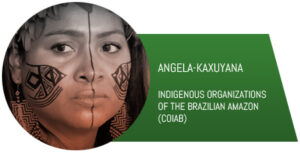 Ângela Amanakwa Kaxuyana is from the KAHYANA Indigenous people of the Katxuyana-Tunayana- Oriximiná/Pará indigenous land. She is Current Treasury Coordinator of the largest Indigenous regional organization in Brazil, the Coordination of Indigenous Organizations in the Brazilian Amazon (COIAB). She also is co-founder and executive member of the Federation of Indigenous Peoples of Pará and Technical Advisor to the Katxuyana, Kahyana and Tunayana Indigenous association. She graduated with a bachelor’s degree in Administration with Qualification in Environmental Management, and Post-Graduated in Management, Consulting and Environmental Auditing.
Ângela Amanakwa Kaxuyana is from the KAHYANA Indigenous people of the Katxuyana-Tunayana- Oriximiná/Pará indigenous land. She is Current Treasury Coordinator of the largest Indigenous regional organization in Brazil, the Coordination of Indigenous Organizations in the Brazilian Amazon (COIAB). She also is co-founder and executive member of the Federation of Indigenous Peoples of Pará and Technical Advisor to the Katxuyana, Kahyana and Tunayana Indigenous association. She graduated with a bachelor’s degree in Administration with Qualification in Environmental Management, and Post-Graduated in Management, Consulting and Environmental Auditing.
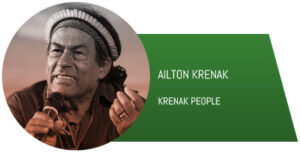 Ailton Krenak is a renowned Indigenous activist and leader, who demonstrates that our current environmental crisis is rooted in society’s flawed concept of “humanity.” He was born in 1953 in the region of the Rio Doce valley (MG), territory of the Krenak People — a name he carries with him, a place that has been destroyed by mining. In the past, he has joined forces with Chico Mendes for the defense of Indigenous rights in 1988 Constitution and has developed various activities in the socio-environmental movement, such as the promotion of the Alliance of the Peoples of the Forest, which brings together Indigenous and riverside communities in the Amazon. He is the author of the book Ideas to Postpone the End of the World (2020).
Ailton Krenak is a renowned Indigenous activist and leader, who demonstrates that our current environmental crisis is rooted in society’s flawed concept of “humanity.” He was born in 1953 in the region of the Rio Doce valley (MG), territory of the Krenak People — a name he carries with him, a place that has been destroyed by mining. In the past, he has joined forces with Chico Mendes for the defense of Indigenous rights in 1988 Constitution and has developed various activities in the socio-environmental movement, such as the promotion of the Alliance of the Peoples of the Forest, which brings together Indigenous and riverside communities in the Amazon. He is the author of the book Ideas to Postpone the End of the World (2020).
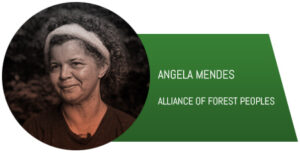 Angela Mendes is the daughter of rubber tapper leader Chico Mendes (1944–1988), and activist associated with The Alliance of Forest Peoples, which challenges the public policies of the Jair Bolsonaro government and their treatment of Indigenous areas. Mendes is also an environmentalist and coordinator of the Chico Mendes Committee.
Angela Mendes is the daughter of rubber tapper leader Chico Mendes (1944–1988), and activist associated with The Alliance of Forest Peoples, which challenges the public policies of the Jair Bolsonaro government and their treatment of Indigenous areas. Mendes is also an environmentalist and coordinator of the Chico Mendes Committee.
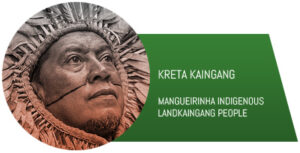
Kretã Kaingang is from the Mangueirinha Indigenous Land, an area of Atlantic Forest in the countryside of Paraná, threatened continuously by loggers. In April 2003, Kretã and his people, Kaingang, helped create the Free Land Camp (Acampamento Terra Livre) in Brasilia, along with the Guarani and Xoklêng peoples. Son of the legendary Chief Kaingang Angelo Kretã and one of the founders of the Terra Livre Camp, which has been held annually in Brasilia since 2003, Kretã is always present at that national gathering of over 300 Brazilian indigenous peoples groups. He is also one of the founders of the Coalition of the Southern Indigenous Peoples (ARPINSUL), an entity that also exposes the violence with which its peoples are treated in the region—a place of severely violent land disputes with farmers and loggers. Kretã also helped found the Coalition of the Indigenous Peoples of Brazil (APIB), initiated and led the indigenous battle against fracking in Brazil, which enables the extraction of oil, gas, and coal from the soil, and he continues in the fight to defend indigenous territories.
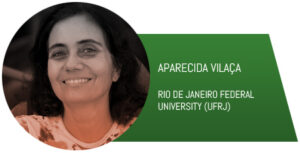 Aparecida Vilaça has a PhD in Social Anthropology from Federal University of Rio de Janeiro (UFRJ) and is Professor of Social Anthropology at the same university. She is researcher of the National Resarch Council (CNPq) and of the Rio de Janeiro State research foundation (Faperj). Since 1986 she works among the Wari’ Indians in Southwestern Amazonia, Brazil. She has specialized in the study of socio-cultural changes among Indigenous peoples, with an emphasis on conversion to Christianity and schooling. Her current research focuses on the learning of science by Wari’ children and young people, with the aim of understanding the equivocations produced in the encounter between different ontologies, especially regarding the idea of nature. She is the author of Strange Enemies. Indigenous Agency and Scenes of Encounters in Amazonia(2010), Praying and Preying. Christianity in Indigenous Amazonia (2016), Paletó e eu(2018), Morte na Floresta (2020) and co-editor, with Geoffrey Lloyd, of Science in the Forest, Science in the Past (2019) and with Robin Wright of Native Christians. Modes and Effects of Christianity among Indigenous Peoples of the Americas (2009).
Aparecida Vilaça has a PhD in Social Anthropology from Federal University of Rio de Janeiro (UFRJ) and is Professor of Social Anthropology at the same university. She is researcher of the National Resarch Council (CNPq) and of the Rio de Janeiro State research foundation (Faperj). Since 1986 she works among the Wari’ Indians in Southwestern Amazonia, Brazil. She has specialized in the study of socio-cultural changes among Indigenous peoples, with an emphasis on conversion to Christianity and schooling. Her current research focuses on the learning of science by Wari’ children and young people, with the aim of understanding the equivocations produced in the encounter between different ontologies, especially regarding the idea of nature. She is the author of Strange Enemies. Indigenous Agency and Scenes of Encounters in Amazonia(2010), Praying and Preying. Christianity in Indigenous Amazonia (2016), Paletó e eu(2018), Morte na Floresta (2020) and co-editor, with Geoffrey Lloyd, of Science in the Forest, Science in the Past (2019) and with Robin Wright of Native Christians. Modes and Effects of Christianity among Indigenous Peoples of the Americas (2009).
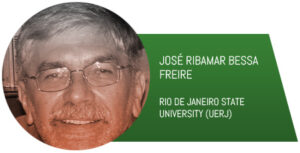 José Ribamar Bessa Freire holds a PhD in Letters from the State University of Rio de Janeiro (UERJ). He also has a doctorate in History from the École des Hautes Études en Sciences Sociales, in France. He supervises masters and doctoral research at the Graduate Program in Social Memory at the Federal University of the State of Rio de Janeiro (Unirio). He is a professor at UERJ, where he coordinates the Program for the Study of Indigenous Peoples. He participates in Anpoll’s Sociolinguistics Working Group and is a consultant to the Ministry of Education on issues of Indigenous education. He published several books, including Rio Babel: The History of Languages in the Amazon (2004) and O Português e o Tupi no Brasil (2010).
José Ribamar Bessa Freire holds a PhD in Letters from the State University of Rio de Janeiro (UERJ). He also has a doctorate in History from the École des Hautes Études en Sciences Sociales, in France. He supervises masters and doctoral research at the Graduate Program in Social Memory at the Federal University of the State of Rio de Janeiro (Unirio). He is a professor at UERJ, where he coordinates the Program for the Study of Indigenous Peoples. He participates in Anpoll’s Sociolinguistics Working Group and is a consultant to the Ministry of Education on issues of Indigenous education. He published several books, including Rio Babel: The History of Languages in the Amazon (2004) and O Português e o Tupi no Brasil (2010).
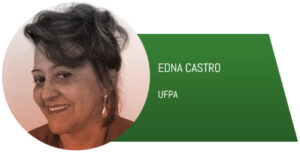 Edna Maria Ramos de Castro graduated in Social Sciences from the Federal University of Pará (1969). Since 1973 she has been a professor at UFPA. She obtained a master’s degree in 1978 and a doctorate in 1983 in Sociology from the Ecole des Hautes Etudes en Sciences Sociales. She was director of the Center for High Amazon Studies (NAEA/UFPA) in the periods (1997–2000) and (2005–2009). She was president of the National Association of Graduate Studies and Research in Urban and Regional Planning (2007–2009) and member of the board of the Brazilian Society of Sociology and the Brazilian Society for the Progress of Science.
Edna Maria Ramos de Castro graduated in Social Sciences from the Federal University of Pará (1969). Since 1973 she has been a professor at UFPA. She obtained a master’s degree in 1978 and a doctorate in 1983 in Sociology from the Ecole des Hautes Etudes en Sciences Sociales. She was director of the Center for High Amazon Studies (NAEA/UFPA) in the periods (1997–2000) and (2005–2009). She was president of the National Association of Graduate Studies and Research in Urban and Regional Planning (2007–2009) and member of the board of the Brazilian Society of Sociology and the Brazilian Society for the Progress of Science.
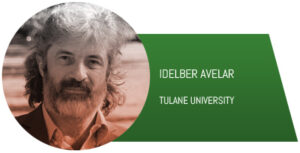 Idelber Avelar is a Full Professor, who specializes in contemporary Latin American fiction, literary theory, and Cultural Studies. He received his Ph.D. from Duke University in 1996 and joined Tulane in 1999. He is the author of and The Untimely Present: Postdictatorial Latin American Fiction and the Task of Mourning (1999), winner of the MLA Kovacs prize, Crônicas do estado de exceção (2014) and Transculturación en suspenso: Los orígenes de los cánones narrativos colombianos (2015). He also co-edited Brazilian Popular Music and Citizenship with Christopher Dunn in 2011.
Idelber Avelar is a Full Professor, who specializes in contemporary Latin American fiction, literary theory, and Cultural Studies. He received his Ph.D. from Duke University in 1996 and joined Tulane in 1999. He is the author of and The Untimely Present: Postdictatorial Latin American Fiction and the Task of Mourning (1999), winner of the MLA Kovacs prize, Crônicas do estado de exceção (2014) and Transculturación en suspenso: Los orígenes de los cánones narrativos colombianos (2015). He also co-edited Brazilian Popular Music and Citizenship with Christopher Dunn in 2011.
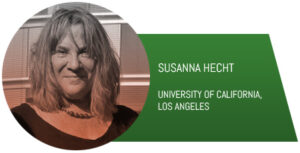 Susanna B. Hecht is an American geographer, Professor of Urban Planning at UCLA, and Professor of International History at the Graduate Institute of International and Development Studies in Geneva. She is a specialist on tropical development in Latin America, especially the Amazon Basin and Central America. Her research focuses largely on land use change in the Latin American tropics. Her work represents a remarkable integration of the humanities, including the history of ideas, social and environmental history, and the social sciences of development into the dynamics and sciences of tropical and planetary change, expansion, border issues, and internal migrations in the nineteenth century. She is the author of The Scramble for the Amazon ( and the Lost Paradise of Euclides da Cunha (2013) and The Social Lives of Forests: Past, Present, and Future of Woodland Resurgence (2014).
Susanna B. Hecht is an American geographer, Professor of Urban Planning at UCLA, and Professor of International History at the Graduate Institute of International and Development Studies in Geneva. She is a specialist on tropical development in Latin America, especially the Amazon Basin and Central America. Her research focuses largely on land use change in the Latin American tropics. Her work represents a remarkable integration of the humanities, including the history of ideas, social and environmental history, and the social sciences of development into the dynamics and sciences of tropical and planetary change, expansion, border issues, and internal migrations in the nineteenth century. She is the author of The Scramble for the Amazon ( and the Lost Paradise of Euclides da Cunha (2013) and The Social Lives of Forests: Past, Present, and Future of Woodland Resurgence (2014).
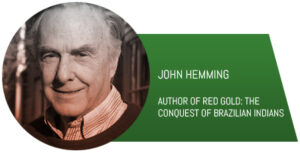 John Hemming is a world authority on Brazilian Indians, the Amazon environment, the Incas, Peruvian archaeology and the history of exploration generally. He has traveled in, studied and written extensively about the Amazon region. He served as Director of the Royal Geographical Society and the author of many books, including The Conquest of the Incas. He is a renowned explorer of Amazonia and the leading authority of Brazil’s Indigenous people. His last book published last year is People of the Rainforest: The Villas Boas Brothers, Explorers and Humanitarians of the Amazon (2019).
John Hemming is a world authority on Brazilian Indians, the Amazon environment, the Incas, Peruvian archaeology and the history of exploration generally. He has traveled in, studied and written extensively about the Amazon region. He served as Director of the Royal Geographical Society and the author of many books, including The Conquest of the Incas. He is a renowned explorer of Amazonia and the leading authority of Brazil’s Indigenous people. His last book published last year is People of the Rainforest: The Villas Boas Brothers, Explorers and Humanitarians of the Amazon (2019).
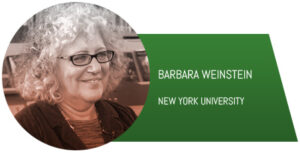 Barbara Weinstein is Silver Professor of History at New York University and Past President of the American Historical Association. Her research interests include race, gender, labor, and political economy, especially in relation to the making of modern Brazil. Her publications include The Amazon Rubber Boom, 1850–1920 (1983), For Social Peace in Brazil: Industrialists and the Remaking of the Working Class in São Paulo (1996), and The Color of Modernity: São Paulo and the Making of Race and Nation in Brazil (2015).
Barbara Weinstein is Silver Professor of History at New York University and Past President of the American Historical Association. Her research interests include race, gender, labor, and political economy, especially in relation to the making of modern Brazil. Her publications include The Amazon Rubber Boom, 1850–1920 (1983), For Social Peace in Brazil: Industrialists and the Remaking of the Working Class in São Paulo (1996), and The Color of Modernity: São Paulo and the Making of Race and Nation in Brazil (2015).
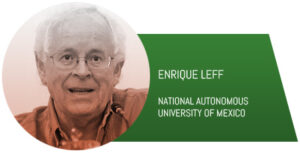 Enrique Leff is a Mexican economist and environmental theorist working in the fields of Political Ecology, Environmental Epistemology and Philosophy, Ecological Economics and Environmental Education. He is currently a senior researcher of the Social Research Institute and professor of Political and Social Sciences at the National Autonomous University of Mexico. He has written books and articles on political ecology, environmental sociology, environmental economics, environmental epistemology and environmental education. He is regarded as one of the key environmental thinkers in Latin America. He is the author of El fuego de la vida: Heidegger ante la cuestión Ambiental (2018).
Enrique Leff is a Mexican economist and environmental theorist working in the fields of Political Ecology, Environmental Epistemology and Philosophy, Ecological Economics and Environmental Education. He is currently a senior researcher of the Social Research Institute and professor of Political and Social Sciences at the National Autonomous University of Mexico. He has written books and articles on political ecology, environmental sociology, environmental economics, environmental epistemology and environmental education. He is regarded as one of the key environmental thinkers in Latin America. He is the author of El fuego de la vida: Heidegger ante la cuestión Ambiental (2018).
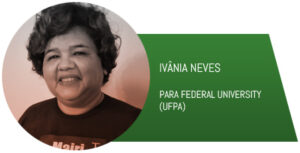
Ivânia Neves has a PhD in Linguistics, in the area of Discourse Analysis from the University of Campinas (Unicamp) and a master’s degree in Anthropology from the Federal University of Pará (UFPA). She also was awarded a Jabuti 2000 Award, in the didactic category. She specializes in Linguistics, Communication and Anthropology and conducts research about Indigenous Tupi societies and didactic experiments with new information technologies. She is currently a Professor at the Institute of Letters and Communication (ILC) at the Federal University of Pará (UFPA) and a permanent Professor at the Postgraduate Program in Letters.
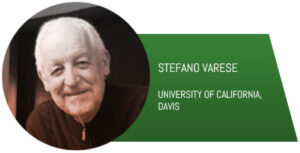 Stefano Varese is Professor Emeritus of Native American Studies at the University of California. He is the director of the Indigenous Research Center of the Americas. He is an anthropologist and specializes in Indigenous people (American Indians, Native Americans) of the Americas. His areas of concentration include Indian community development, agro-ecological and sustainable development, cultural, economic, political self-determination, territorial management, rural-urban migration, transnational migration, cultural resource management, poverty alleviation strategies, and human rights. He is the author of Witness to Sovereignty: Essays on the Indian Movement in Latin America (2016) and The Art of Memory: An Ethnographer’s Journey (2020).
Stefano Varese is Professor Emeritus of Native American Studies at the University of California. He is the director of the Indigenous Research Center of the Americas. He is an anthropologist and specializes in Indigenous people (American Indians, Native Americans) of the Americas. His areas of concentration include Indian community development, agro-ecological and sustainable development, cultural, economic, political self-determination, territorial management, rural-urban migration, transnational migration, cultural resource management, poverty alleviation strategies, and human rights. He is the author of Witness to Sovereignty: Essays on the Indian Movement in Latin America (2016) and The Art of Memory: An Ethnographer’s Journey (2020).
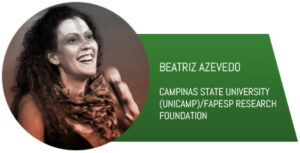 Beatriz Azevedo is a Brazilian poet, singer, composer, and multi-artist from São Paulo. Based in Rio de Janeiro, she has emerged in recent years as “one of Brazil’s most innovative artists.” She holds a PhD in Performing Arts and Master in Comparative Literature from the University of São Paulo (USP). She studied music at Mannes College of Music in New York and dramaturgy at Sala Beckett in Barcelona. She is currently a postdoctoral researcher at UNICAMP (State University of Campinas). Beatriz has performed widely throughout Brazil, Europe, and the United States. She also created the performance poetry Peripatetic ground poem, which she presented at international festivals. She is the author of the book Antropofagia: Palimpsesto Selvagem (2018).
Beatriz Azevedo is a Brazilian poet, singer, composer, and multi-artist from São Paulo. Based in Rio de Janeiro, she has emerged in recent years as “one of Brazil’s most innovative artists.” She holds a PhD in Performing Arts and Master in Comparative Literature from the University of São Paulo (USP). She studied music at Mannes College of Music in New York and dramaturgy at Sala Beckett in Barcelona. She is currently a postdoctoral researcher at UNICAMP (State University of Campinas). Beatriz has performed widely throughout Brazil, Europe, and the United States. She also created the performance poetry Peripatetic ground poem, which she presented at international festivals. She is the author of the book Antropofagia: Palimpsesto Selvagem (2018).
 Erik Jennings is a neurosurgeon and Professor at The University of Western Pará. He is the health coordinator of the Zo’é people, a recently contacted Indigenous tribe of the Amazon rainforest for about eighteen years. He is an environmental activist and defender of the rights and culture of Indigenous peoples. He is currently a consultant for the Ministry of Health for health issues involving isolated Indigenous peoples from recent contact. In addition, he coordinates the neurosurgery medical residency program at the State University of Pará (UEPA). He is the author of Paradô: histórias vividas por um neurocirurgião na Amazônia (2015) and Olhando o Rio (2019).
Erik Jennings is a neurosurgeon and Professor at The University of Western Pará. He is the health coordinator of the Zo’é people, a recently contacted Indigenous tribe of the Amazon rainforest for about eighteen years. He is an environmental activist and defender of the rights and culture of Indigenous peoples. He is currently a consultant for the Ministry of Health for health issues involving isolated Indigenous peoples from recent contact. In addition, he coordinates the neurosurgery medical residency program at the State University of Pará (UEPA). He is the author of Paradô: histórias vividas por um neurocirurgião na Amazônia (2015) and Olhando o Rio (2019).
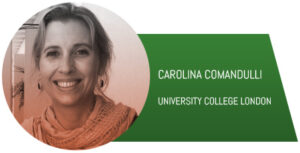 Carolina Schneider Comandulli has an MSc in Anthropology and Ecology of Development from University College London (UCL) and is currently completing her PhD in Anthropology at UCL. She has been involved for over 15 years with Indigenous peoples in the Amazon and Atlantic rainforests, and occupied key positions from the government/policy building sector to direct work and engagement with local indigenous organizations. She is the co-founder of CLOSER, a multidisciplinary research group on Brazilian socio-environmental research, and a member of the Extreme Citizen Science (ExCiteS) research group and of the Centre for the Anthropology of Sustainability (CAOS).
Carolina Schneider Comandulli has an MSc in Anthropology and Ecology of Development from University College London (UCL) and is currently completing her PhD in Anthropology at UCL. She has been involved for over 15 years with Indigenous peoples in the Amazon and Atlantic rainforests, and occupied key positions from the government/policy building sector to direct work and engagement with local indigenous organizations. She is the co-founder of CLOSER, a multidisciplinary research group on Brazilian socio-environmental research, and a member of the Extreme Citizen Science (ExCiteS) research group and of the Centre for the Anthropology of Sustainability (CAOS).
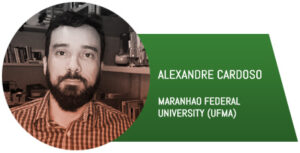 Alexandre Cardoso is a Professor at the Federal University of Maranhão (UFMA) at the college of Humanities/History. He has a PhD in History from the University of São Paulo (USP) and completed his undergraduate and master’s degree in History at the Federal University at Ceára (UFC). He is part of the research group “workers, power and sociability networks in the Amazon,” affiliated with CNPq and college of History at the Federal University of Amapá. He has developed research in the Social History of the Amazon, with an emphasis on economic.
Alexandre Cardoso is a Professor at the Federal University of Maranhão (UFMA) at the college of Humanities/History. He has a PhD in History from the University of São Paulo (USP) and completed his undergraduate and master’s degree in History at the Federal University at Ceára (UFC). He is part of the research group “workers, power and sociability networks in the Amazon,” affiliated with CNPq and college of History at the Federal University of Amapá. He has developed research in the Social History of the Amazon, with an emphasis on economic.
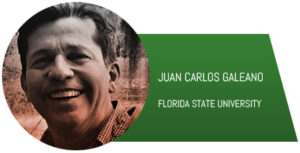
Juan Carlos Galeano is a poet and environmentalist who has published several books of poetry and has translated the works of North American poets into Spanish. Over a decade of fieldwork on symbolic narratives of riverine and forest people in the Amazon basin resulted in his production of a comprehensive collection of storytelling (Folktales of the Amazon, ABC-CLIO, 2009) translated into several languages, and two documentaries on religiosity and ecological spirituality of Amazonians. His poetry inspired by Amazonian cosmologies and the modern world (Amazonia 2003, 2012, Historias del viento 2013, and Yakumama and other Mythical Beings, 2014), has been anthologized and published in international journals such Casa de las Américas (Cuba), The Atlantic Monthly, Ploughshares (U.S.) and Poesia (Italy).
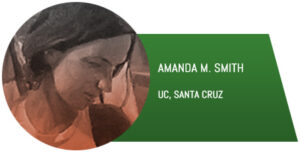 Amanda M. Smith is Assistant Professor of Latin American Literature at the University of California, Santa Cruz. Her book, Mapping the Amazon: Literary Geography after the Rubber Boom, is under contract with Liverpool University Press and slated for a 2021 publication.
Amanda M. Smith is Assistant Professor of Latin American Literature at the University of California, Santa Cruz. Her book, Mapping the Amazon: Literary Geography after the Rubber Boom, is under contract with Liverpool University Press and slated for a 2021 publication.
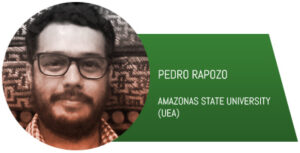 Pedro Rapozo is a Professor at the State University of Amazonas (UEA) and Professor of the Graduate Program in the National Network for the Teaching of Environmental Sciences (PROFCIAMB). He obtained a master’s degree in Sociology from the Federal University of Amazonas (UFAM) and PhD in Sociology – Development and Social Policies at the University of Minho (UM). He works in the field of Rural Sociology, and State and Development Policies in the Brazilian Amazon. He specializes in the topics: Environmental Governance, Protected Areas, Indigenous Peoples, Borders, Violence, Mining, Territorialization Processes and Socio-environmental Conflicts.
Pedro Rapozo is a Professor at the State University of Amazonas (UEA) and Professor of the Graduate Program in the National Network for the Teaching of Environmental Sciences (PROFCIAMB). He obtained a master’s degree in Sociology from the Federal University of Amazonas (UFAM) and PhD in Sociology – Development and Social Policies at the University of Minho (UM). He works in the field of Rural Sociology, and State and Development Policies in the Brazilian Amazon. He specializes in the topics: Environmental Governance, Protected Areas, Indigenous Peoples, Borders, Violence, Mining, Territorialization Processes and Socio-environmental Conflicts.
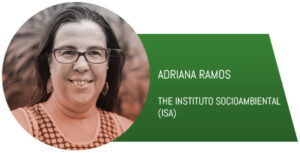 Adriana Ramos coordinates the Policy and Law Program of the Instituto Socioambiental (ISA), and have been working on advocacy to improve social and environmental legislation and policies related to Indigenous people’s rights, tropical forests, and other ecosystems in Brazil.
Adriana Ramos coordinates the Policy and Law Program of the Instituto Socioambiental (ISA), and have been working on advocacy to improve social and environmental legislation and policies related to Indigenous people’s rights, tropical forests, and other ecosystems in Brazil.
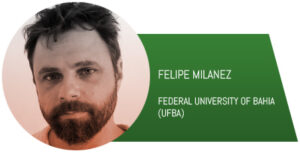 Felipe Milanez is a political ecologist and Associate Professor at the Institute for Humanities, Arts and Sciences of the Federal University of Bahia (UFBA). He is the coordinator of the Working Group of Political Ecologies Desde Abya Yala, of the Latin America Social Sciences Council, and holds a PhD in Social Studies at the University of Coimbra, Portugal, part of the European Network of Political Ecology. He is an associated researcher at the Culture and Society Post-Graduate program at the Federal University of Bahia and holds a master’s degree in the History of Africa, Diaspora and Indigenous Peoples and the Federal University of Reconcavo of Bahia.
Felipe Milanez is a political ecologist and Associate Professor at the Institute for Humanities, Arts and Sciences of the Federal University of Bahia (UFBA). He is the coordinator of the Working Group of Political Ecologies Desde Abya Yala, of the Latin America Social Sciences Council, and holds a PhD in Social Studies at the University of Coimbra, Portugal, part of the European Network of Political Ecology. He is an associated researcher at the Culture and Society Post-Graduate program at the Federal University of Bahia and holds a master’s degree in the History of Africa, Diaspora and Indigenous Peoples and the Federal University of Reconcavo of Bahia.
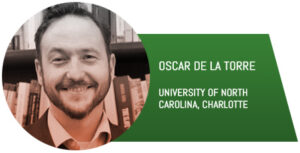 Oscar de la Torre is Associate Professor of Africana Studies at UNC Charlotte. He obtained a PhD in History at the University of Pittsburgh in 2011, and a Post-Doctoral Fellowship at Yale University’s Gilder-Lehrman Center for the Study of Slavery, Resistance, and Abolition, in 2014. De la Torre is the author of The People of the River (2018), a social and environmental history of black communities in Amazonia. Currently, he is studying the coexistence of inter-racial experiences and racist ideas in Matanzas, Cuba in the realms of labor, leisure, and disease.
Oscar de la Torre is Associate Professor of Africana Studies at UNC Charlotte. He obtained a PhD in History at the University of Pittsburgh in 2011, and a Post-Doctoral Fellowship at Yale University’s Gilder-Lehrman Center for the Study of Slavery, Resistance, and Abolition, in 2014. De la Torre is the author of The People of the River (2018), a social and environmental history of black communities in Amazonia. Currently, he is studying the coexistence of inter-racial experiences and racist ideas in Matanzas, Cuba in the realms of labor, leisure, and disease.
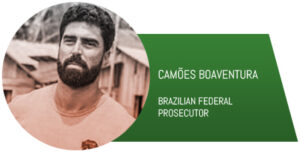 Camões Boaventura is an Attorney of the Republic. He holds a master’s degree in Law from the University of Brasilia (UnB). He is a Specialist in Public Law from the Escola Superior do Ministério Público da União (2013). He was Attorney of the National Treasury (2008–2013) and investigates environmental justice and rights of Indigenous peoples and traditional communities.
Camões Boaventura is an Attorney of the Republic. He holds a master’s degree in Law from the University of Brasilia (UnB). He is a Specialist in Public Law from the Escola Superior do Ministério Público da União (2013). He was Attorney of the National Treasury (2008–2013) and investigates environmental justice and rights of Indigenous peoples and traditional communities.
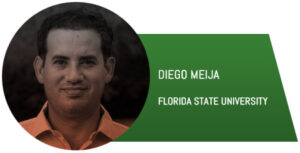 Diego Mejía Prado is a Ph.D. candidate in Spanish literature and cultural studies at Florida State University. He is a biologist from Universidad Javeriana in Colombia, and has a master’s degree in Spanish literature from Florida State University. For his Ph.D. research, Diego studies new strategies of environmental protection and exploitation in natural resources dependent communities in the Peruvian Amazon. Diego has published two books on biological and cultural topics related with plants, and numerous divulgation articles dealing with environmental issues in Colombia.
Diego Mejía Prado is a Ph.D. candidate in Spanish literature and cultural studies at Florida State University. He is a biologist from Universidad Javeriana in Colombia, and has a master’s degree in Spanish literature from Florida State University. For his Ph.D. research, Diego studies new strategies of environmental protection and exploitation in natural resources dependent communities in the Peruvian Amazon. Diego has published two books on biological and cultural topics related with plants, and numerous divulgation articles dealing with environmental issues in Colombia.
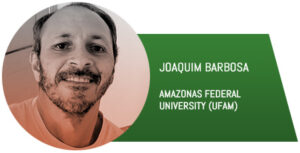 Joaquim Onésimo Ferreira Barbosa holds a PhD and master’s degree in Society and Culture in the Amazon by the Graduate Program Society and Culture in the Amazon at the Federal University of Amazonas (UFAM). He is a collaborating professor at the Federal University of Western Pará (UFOPA). He is the author of the book The Memory in Performance in the Narratives of Rivers and Forests (2015). He specializes in oral narratives and memory, the Amazon and Brazilian cultures, as well as the poetics of modernity, and ecocritics and narratives of women in the Amazon.
Joaquim Onésimo Ferreira Barbosa holds a PhD and master’s degree in Society and Culture in the Amazon by the Graduate Program Society and Culture in the Amazon at the Federal University of Amazonas (UFAM). He is a collaborating professor at the Federal University of Western Pará (UFOPA). He is the author of the book The Memory in Performance in the Narratives of Rivers and Forests (2015). He specializes in oral narratives and memory, the Amazon and Brazilian cultures, as well as the poetics of modernity, and ecocritics and narratives of women in the Amazon.
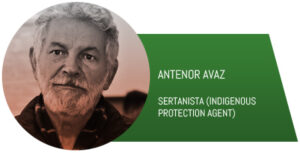 Antenor Vaz is a sertanista (Indigenous Protection Agent) and Consultant for Protection Methodologies and Policies for Indigenous Peoples in Situation of Isolation and Initial Contact. He participated in the creation of the first Indigenous land recognized by the Brazilian government with exclusive use for non-contact Indians (Terra Indígena Massaco). He is currently a consultant for South America at Land is Life and a Consultant for Amazon Conservation Team Colombia on PIACI in South America.
Antenor Vaz is a sertanista (Indigenous Protection Agent) and Consultant for Protection Methodologies and Policies for Indigenous Peoples in Situation of Isolation and Initial Contact. He participated in the creation of the first Indigenous land recognized by the Brazilian government with exclusive use for non-contact Indians (Terra Indígena Massaco). He is currently a consultant for South America at Land is Life and a Consultant for Amazon Conservation Team Colombia on PIACI in South America.
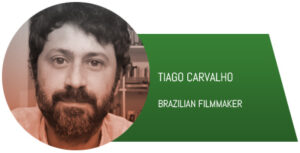
Tiago Carvalho has been working as a filmmaker side by side to popular organizations in Brazil, especially peasant unions, traditional communities and indigenous peoples for nearly 15 years. “The pink indian against the invisible beast” is his first feature documentary.
Organizers:
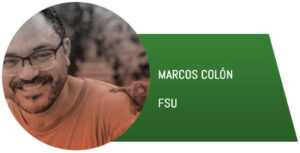 Marcos Colón leads the Program of Portuguese at Florida State University. He received his PhD in Spanish and Portuguese Cultural Studies from the University of Wisconsin-Madison in 2019. His research focuses on Brazilian literary and cultural studies, with a particular emphasis on representations of the Amazon in twentieth- and twenty-first-century Brazilian literature and film. He has produced and directed two documentary films that represent diverse perspectives on humanity’s complex relations with the natural world: Beyond Fordlândia: An Environmental Account of Henry Ford’s Adventure in the Amazon, 2018 and Zo’é, based on his experiences with the Zo’é tribe, an Amazonian indigenous community that has had little to no contact with the outside world (2018). He is the editor and creator of Amazonia Latitude, a digital environmental magazine.
Marcos Colón leads the Program of Portuguese at Florida State University. He received his PhD in Spanish and Portuguese Cultural Studies from the University of Wisconsin-Madison in 2019. His research focuses on Brazilian literary and cultural studies, with a particular emphasis on representations of the Amazon in twentieth- and twenty-first-century Brazilian literature and film. He has produced and directed two documentary films that represent diverse perspectives on humanity’s complex relations with the natural world: Beyond Fordlândia: An Environmental Account of Henry Ford’s Adventure in the Amazon, 2018 and Zo’é, based on his experiences with the Zo’é tribe, an Amazonian indigenous community that has had little to no contact with the outside world (2018). He is the editor and creator of Amazonia Latitude, a digital environmental magazine.
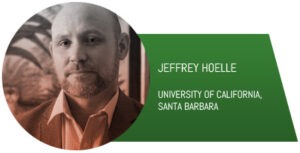 Jeffrey Hoelle is Associate Professor of Anthropology at the University of California, Santa Barbara. His research focuses on cattle raising, gold mining, and land conflict in the Brazilian Amazon, with the aim of providing a deeper understanding of the social, cultural, and political-economic dimensions of environmental degradation and social inequality. He is the author of the book Rainforest Cowboys: The Rise of Ranching and Cattle Culture in Western Amazonia.
Jeffrey Hoelle is Associate Professor of Anthropology at the University of California, Santa Barbara. His research focuses on cattle raising, gold mining, and land conflict in the Brazilian Amazon, with the aim of providing a deeper understanding of the social, cultural, and political-economic dimensions of environmental degradation and social inequality. He is the author of the book Rainforest Cowboys: The Rise of Ranching and Cattle Culture in Western Amazonia.
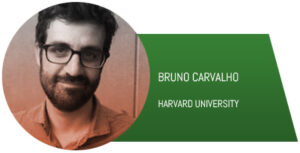 Bruno Carvalho is a Professor of Romance Languages and Literatures and African and African American Studies at Harvard University and Co-Director of the Harvard Mellon Urban Initiative. Carvalho works on cities as lived and imagined spaces. He studies relationships between cultural practices and urbanization, specializing on Brazil from the eighteenth century onward. Carvalho’s interdisciplinary approaches bridge history, literary analysis, and urban studies. Often, he investigates how socio-cultural processes of the past converge in and with the present. He is writing a book on different ways in which people imagined the future of cities over the past two centuries.
Bruno Carvalho is a Professor of Romance Languages and Literatures and African and African American Studies at Harvard University and Co-Director of the Harvard Mellon Urban Initiative. Carvalho works on cities as lived and imagined spaces. He studies relationships between cultural practices and urbanization, specializing on Brazil from the eighteenth century onward. Carvalho’s interdisciplinary approaches bridge history, literary analysis, and urban studies. Often, he investigates how socio-cultural processes of the past converge in and with the present. He is writing a book on different ways in which people imagined the future of cities over the past two centuries.

Jessica Carey-Webb’s work at NRDC focuses on protecting the Chihuahuan grasslands, deforestation in the Brazilian Amazon, and on water initiatives in Chile. She joins NRDC as part of the ACLS/Mellon Public Fellows program. She holds a B.A. in Spanish and Latin American studies from the University of Michigan and a PhD in Spanish and Portuguese from the University of Texas at Austin. Her previous research focused on the historical development of the Amazon region and her book manuscript, Eyes on Amazonia, examines the role of travel narratives and mapping during the first rubber boom.
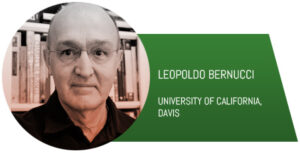 Leopoldo Bernucci is The Russell F. and Jean H. Fiddyment Chair in Latin American Studies in the Department of Spanish and Portuguese at UC Davis. He earned his Ph.D. degree, specializing in Spanish language and Latin American literature, from the University of Michigan at Ann Arbor in 1986. He is author, co-author, and editor of numerous essays and the following scholarly books on colonial, 19th- and 20th- century Spanish American and Brazilian literature and culture. Professor Bernucci is the founder and director of the Luso-Brazilian Studies section in Department of Spanish and Portuguese at UC Davis. He is the author of Paraíso suspeito: a voragem amazônica (2018) and Euclides da Cunha: Ensaios e Inéditos (2019).
Leopoldo Bernucci is The Russell F. and Jean H. Fiddyment Chair in Latin American Studies in the Department of Spanish and Portuguese at UC Davis. He earned his Ph.D. degree, specializing in Spanish language and Latin American literature, from the University of Michigan at Ann Arbor in 1986. He is author, co-author, and editor of numerous essays and the following scholarly books on colonial, 19th- and 20th- century Spanish American and Brazilian literature and culture. Professor Bernucci is the founder and director of the Luso-Brazilian Studies section in Department of Spanish and Portuguese at UC Davis. He is the author of Paraíso suspeito: a voragem amazônica (2018) and Euclides da Cunha: Ensaios e Inéditos (2019).
Registration
Amazonia Now: Perspectives on a Region in Crisis — Day I
https://fsu.zoom.us/webinar/register/WN_MJKcBpI2Q-yfd0Y_KBnnzg
Amazonia Now: Perspectives on a Region in Crisis — Day II
https://fsu.zoom.us/webinar/register/WN_JE0bKnDEQMmODu7ooIQN7A
Amazonia Now: Perspectives on a Region in Crisis — Day III
https://fsu.zoom.us/webinar/register/WN_pw_SucBpSo-gglqKTo24cQ
Amazonia Now: Perspectives on a Region in Crisis — Day IV
https://fsu.zoom.us/webinar/register/WN_YFA2dX43Q5e5VwK-qDEm_A
Contact
![]()
For more information and program details email Dr. Marcos Colón at [email protected].

